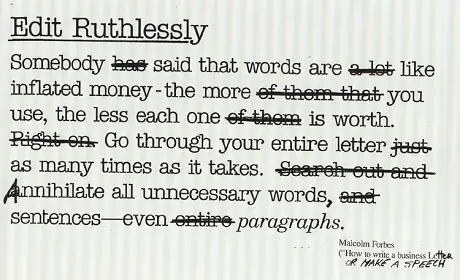21 Quick Thoughts to Make the Writing Process Less Grueling

Let’s face it—writing can be a grueling task. Sometimes you don’t want to do it. Your brain uses a lot of energy writing and you can suffer fatigue.
Red Smith, Pulitzer Prize-winning sports writer for the New York Times, was once asked if writing was easy for him. His answer, contained in his book Making Words Dance: Reflections on Red Smith, Journalism and Writing, was poignant. He said, "Sure. All I do is cut open a vein and bleed."
Along the lines of Smith’s confessions that writing is not an easy task even for the most talented among us, Olin Miller - author of Four Thousand Errors - explained it even more vividly when he said, “Writing is the hardest way of earning a living, with the possible exception of wrestling alligators.”
Why writing is difficult
Philip Pullman, author of award winning His Dark Materials trilogy, offers us an explanation why writing is hard: “The fact is that writing is hard work, and sometimes you don’t want to do it, and you can’t think of what to write next, and you’re fed up with the whole damn business.”
But, just because writing is hard doesn’t mean you shouldn’t do it. “Do you think plumbers don’t feel like that about their work from time to time?” Pullman asks. “Of course, there will be days when the stuff is not flowing freely. What you do then is MAKE IT UP,” he advises.
Tips to MAKE IT UP
Anyone who is a writer, whether a web writer, copywriter, script writer, or poet, knows writing is grueling at times. You often struggle with what Steven Pressfield calls the "Resistance"—our psychological resistance to get beyond fear and start, regardless of where it takes us.
For those of us struggling with Resistance, as well as other writers’ peeves like procrastination and creative blocks, here are some quick tips to help make the writing process a little less painful.
This is how you MAKE IT UP and MAKE IT HAPPEN...
1. Write—at least 15 minutes every day. Like running, the more you do it, the better you get at it.
2. Outline. Outline. Outline. This will help to organize your thoughts and ensure your text has a clear overall structure and forward momentum.
3. Write first. You’ll come back to it later with fresh eyes for editing.
4. Turn off your Internet connection. It'll remove distractions and enhance focus when writing.
5. When you’re stuck, don’t keep staring at the screen. Take a break, and come back to it.
6. Don’t be afraid to try new words. Be afraid not to try.
7. Write in uninterrupted sessions with regular breaks in between.
8. Use plain English—clear, straightforward expression. Up to 40% of Internet users are people with low literacy levels.
9. And you can start a sentence with a conjunction. Nearly all major style guides say doing so is fine.
10. Prefer active sentences and concrete words to passive, abstract words and phrases.
11. Take risks; Don’t hold back; Let all that is in you freely pour out onto the page.
12. Allow your writing to “cool off" for a few hours or a few days. Time will tell you much about what you need to revise.
13. Read as much and as often as you can. There is no way around it.
14. Do your research. Writing when you have nothing to say will lead to instant frustration.
15. Keep your audience in mind—what’s in it for them? People won’t care if it is not relevant to them.
16. Edit ruthlessly. Nothing shouts “armature” than extraneous, obnoxious words and phrases.

17. Read your work out aloud and change or edit anything that doesn’t sound quite right.
18. Hand your work over to someone else to proofread and edit for you.
19. Analyze the feedback you get, and rewrite as necessary. Don’t bristle at suggestions to correct and improve your work.
20. Make final adjustments to your piece so it is just what you want, and then…
21. Stop. Be done with it. Move onto the next project.
Bonus tip:
Carry a collection device like a notepad or iPhone with you for when you have creative ideas and thoughts at inconvenient times.
Photo: yukapokova via Getty Images




















